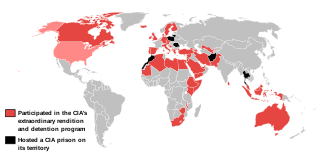
Abu Zubaydah is a Palestinian citizen and alleged terrorist born in Saudi Arabia currently held by the U.S. in the Guantanamo Bay detention camp in Cuba. He is held under the authority of Authorization for Use of Military Force Against Terrorists (AUMF).
Lemon v. Kurtzman, 403 U.S. 602 (1971), was a case argued before the Supreme Court of the United States. The court ruled in an 8–0 decision that Pennsylvania's Nonpublic Elementary and Secondary Education Act from 1968 was unconstitutional and in an 8–1 decision that Rhode Island's 1969 Salary Supplement Act was unconstitutional, violating the Establishment Clause of the First Amendment. The act allowed the Superintendent of Public Schools to reimburse private schools for the salaries of teachers who taught in these private elementary schools from public textbooks and with public instructional materials. Lemon was a major precedent in federal and local courts until it was effectively overturned by Kennedy v. Bremerton School District in 2022.

The Supreme Court of the United States handed down nine per curiam opinions during its 2016 term, which began October 3, 2016 and concluded October 1, 2017.
Expressions Hair Design v. Schneiderman, 581 U.S. ___ (2017), was a United States Supreme Court decision that held that price controls, when used to prohibit the communication of prices of goods with regards to a surcharge, was a regulation of speech and required an analysis of the First Amendment's protections for freedom of speech.
Nelson v. Colorado, 581 U.S. ___ (2017), is a decision by the Supreme Court of the United States. In a 7-1 decision written by Justice Ruth Bader Ginsburg, the Court held that a state had no right to keep fines and other money based on an invalid conviction. Justice Samuel Alito wrote an opinion concurring in the judgment, Justice Clarence Thomas wrote a dissenting opinion, and Justice Neil Gorsuch did not take part in the consideration or decision of the case.

The Supreme Court of the United States handed down sixteen per curiam opinions during its 2017 term, which began October 2, 2017, and concluded September 30, 2018.
Wilson v. Sellers, 584 U.S. ___ (2018), is a United States Supreme Court case concerning whether a federal court sitting in a habeas corpus proceeding should "look through" a summary ruling to review the last reasoned decision by a state court.

The Supreme Court of the United States handed down seven per curiam opinions during its 2018 term, which began October 1, 2018, and concluded October 6, 2019.

The Supreme Court of the United States handed down ten per curiam opinions during its 2019 term, which began October 7, 2019 and concluded October 4, 2020.

The CIA controls black sites used by the U.S. government in its War on Terror to detain people deemed to be enemy combatants.
Espinoza v. Montana Department of Revenue, 591 U.S. ___ (2020), was a landmark United States Supreme Court case in which the Court ruled that a state-based scholarship program that provides public funds to allow students to attend private schools cannot discriminate against religious schools under the Free Exercise Clause of the Constitution.

The Supreme Court of the United States handed down fourteen per curiam opinions during its 2020 term, which began October 5, 2020 and concluded October 3, 2021.
United States v. Arthrex, Inc., 594 U.S. ___ (2021), was a United States Supreme Court case related to the Appointments Clause of the United States Constitution as it related to patent judges on the Patent Trial and Appeal Board (PTAB). In a complex decision, the Court ruled that these judges were considered "primary officers" under the Appointments Clause, normally subject to appointment through the US President and the US Senate, but to remedy the matter, the Court ruled that the constitutional issue is resolved by allowing the PTAB decisions to be subject to review by the appropriately-appointed Director of the Patent Office.
TransUnion LLC v. Ramirez, 594 U.S. ___ (2021), was a United States Supreme Court case dealing with standing under Article III of the Constitution related to class-action suits against private defendants. In a 5–4 decision, the Court ruled that only those that can show concrete harm have standing to seek damages against private defendants.
City of Austin v. Reagan National Advertising of Austin, LLC, 596 U.S. ___ (2022), was a United States Supreme Court case dealing with the application of zoning restrictions on digital billboards in the city of Austin, Texas. In a 6–3 ruling, the Court ruled that the Austin regulation against off-premise digital signs was content-neutral and thus should be reviewed as a facial challenge rather than a strict scrutiny following from the reasoning in Reed v. Town of Gilbert.
PennEast Pipeline Co. v. New Jersey, 594 U.S. ___ (2021), was a United States Supreme Court case dealing with the sovereign immunity of states to delegated powers of eminent domain granted to private companies from federal agencies, in the specific case, acquiring property for the right-of-way to build a natural gas pipeline. The Court, in a 5–4 decision issued in June 2021, ruled that states, by nature of ratifying the Constitution, gave up their ability to exercise sovereign immunity from the federal government or from those parties whom they have delegated that authority.

The Supreme Court of the United States handed down eight per curiam opinions during its 2021 term, which began October 4, 2021 and concluded October 2, 2022.
Shinn v. Ramirez, 596 U.S. ___ (2022), was a case decided by the United States Supreme Court related to the Antiterrorism and Effective Death Penalty Act of 1996. The court held that new evidence that was not in the state court's records, based on ineffective assistance of post-conviction counsel, could not be used in an appeal to a federal court.
National Federation of Independent Business v. Department of Labor, Occupational Safety and Health Administration, 595 U.S. ___ (2022), is a Supreme Court of the United States case before the Court on an application for a stay of the Occupational Safety and Health Administration's COVID-19 vaccination or test mandate. On January 13, 2022, the Supreme Court ordered a stay of the mandate.
Moore v. Harper, 600 U.S. 1 (2023), is a landmark decision of the Supreme Court of the United States related to independent state legislature theory (ISL), a doctrine that asserts state legislatures have sole authority to establish election laws for federal elections within their respective states without judicial review by state courts, presentment to state governors, and without constraint by state constitutions. The case arose from the redistricting of North Carolina's districts by its legislature after the 2020 United States census, which the state courts found to be too artificial and partisan, and an extreme case of gerrymandering in favor of the Republican Party.



